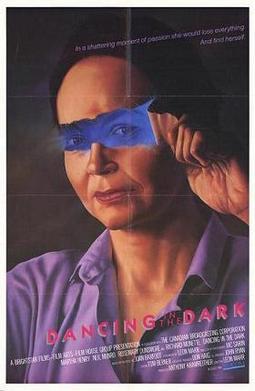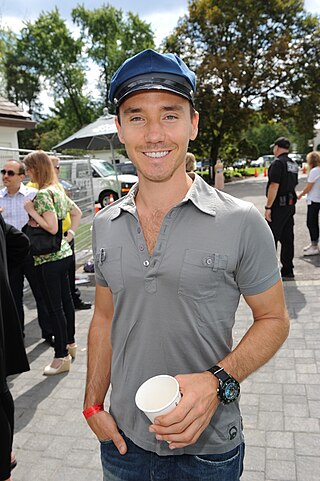Related Research Articles

Bruce McDonald is a Canadian film and television director, writer, and producer. Born in Kingston, Ontario, he rose to prominence in the 1980s as part of the loosely-affiliated Toronto New Wave.
Ronald Mann, credited professionally as Ron Mann, is a Canadian documentary film director.
The Academy of Canadian Cinema and Television presents an annual award for Best Motion Picture to the best Canadian film of the year.
The Academy of Canadian Cinema and Television presents an annual award for Best Achievement in Cinematography, to honour the best Canadian film cinematography.
The Canadian Screen Award for Best Animated Short is awarded by the Academy of Canadian Cinema and Television to the best Canadian animated short film. Formerly part of the Genie Awards, since 2012 it has been presented as part of the Canadian Screen Awards.
The Canadian Screen Award for Best Live Action Short Drama is awarded by the Academy of Canadian Cinema and Television to the best Canadian live action short film. Formerly part of the Genie Awards, since 2012 it has been presented as part of the Canadian Screen Awards.
City of Gold is a 1957 Canadian documentary film by Colin Low and Wolf Koenig, chronicling Dawson City during the Klondike Gold Rush. It made innovative use of archival photos and camera movements to animate still images, while also combining narration and music to bring drama to the whole. Its innovative use of still photography in this manner has been cited by Ken Burns as the source of inspiration for his so-called Ken Burns effect, a type of panning and zooming effect used in video production to animate still images.

Dancing in the Dark is a 1986 Canadian drama film directed and written by Leon Marr, based on the 1982 novel Dancing in the Dark by Joan Barfoot. It was produced by Anthony Kramreither, Don Haig and co-produced by John Ryan. The film is about a housewife, Edna, whose life revolves around her husband Henry. Edna spends her days cleaning the house making sure that it looks spotless and fulfilling her husband's every need in the process. After Henry betrays Edna's trust she murders him and then finds herself in a psychiatric hospital where she relives her old life by writing in her journal.

Rob Stewart was a Canadian photographer, filmmaker and conservationist. He was best known for making and directing the documentary films Sharkwater and Revolution. He drowned at the age of 37 while scuba diving in Florida, filming Sharkwater Extinction.
Jean Beaudin was a Canadian film director and screenwriter. He directed 20 films since 1969. His film J.A. Martin Photographer, was entered into the 1977 Cannes Film Festival, where Monique Mercure won the award for Best Actress. The film also won best Film, he won best Director, and Mercure won best Actress awards at the 1977 Canadian Film Awards. He was nominated for the Genie Award for Best Achievement in Direction in 1986, 1992 and 2003 for his films The Alley Cat , Being at Home with Claude and The Collector , respectively.
Aerlyn Weissman is a two-time Genie Award-winning Canadian documentary filmmaker and political activist on behalf of the lesbian community.

Albert Kish was a Canadian documentarian/filmmaker.
The Academy of Canadian Cinema and Television presents an annual award for Best Feature Length Documentary. First presented in 1968 as part of the Canadian Film Awards, it became part of the Genie Awards in 1980 and the contemporary Canadian Screen Awards in 2013.
John Charles Walker is a Canadian filmmaker and cinematographer.
The Academy of Canadian Cinema and Television's Award for Best Short Documentary is an annual Canadian film award, presented to a film judged to be the year's best short documentary film. Prior to 2012 the award was presented as part of the Genie Awards program; since 2012 it has been presented as part of the expanded Canadian Screen Awards.

Next Floor is a 2008 Canadian dark comedy short film directed by Denis Villeneuve. The film, largely wordless, depicts a group of eleven people endlessly gorging themselves on raw meats at a banquet.
Bones of the Forest is a Canadian documentary film, directed by Heather Frise and Velcrow Ripper and released in 1995. An exploration of the forestry industry, the film depicts a variety of views on the conflict between logging and environmentalism, including those of loggers, alternative forestry practitioners, a vice-president of MacMillan Bloedel, First Nations elders and environmental activists.
Welcome to Canada is a Canadian docufiction film directed by John N. Smith and released in 1989. Loosely based on a real-life incident, the film depicts the interactions of a small community in Newfoundland with a group of Sri Lankan Tamil refugees who turn up in the town. The film's cast includes Charlene Bruff, Madonna Hawkins, Nirmalan Masilamany, Anandprasad Pathanjali, Beverly Power, Francis Power, Rosie Power, Kumar Singam Nadarajah, Murugesu Sivanesan and Sinnakili Baskaran.
Esther Valiquette was a Canadian documentary film director. She is most noted for her 1992 documentary film The Measure of Your Passage , which won the award for Best Short Film at the 1993 Rendez-vous Québec Cinéma, and the Genie Award for Best Short Documentary at the 14th Genie Awards in 1993.
The World Is Watching is a Canadian short documentary film, directed by Peter Raymont and released in 1988. The film examines media coverage of the Nicaraguan Revolution through the lens of an ABC News crew on the ground in the country, documenting the various production pressures and limitations that can hamper the efforts of journalists to fully and accurately report a story; its thesis hinges in part on the fact that Nicaraguan president Daniel Ortega's key announcement that he would negotiate with the Contras was made only after the network's news production deadline for the day, leaving the network's initial reports on ABC World News Tonight able to report that he had made a speech but almost completely unable to say anything informative about it.
References
- 1 2 "Strand's pictures show warm, embracing heart". Toronto Star , March 30, 1990.
- ↑ "Film festival to open Perspective Canada with Speaking Parts". Toronto Star , July 27, 1989.
- ↑ "Private photographer remains in the dark despite thorough film". Kingston Whig-Standard , March 26, 1990.